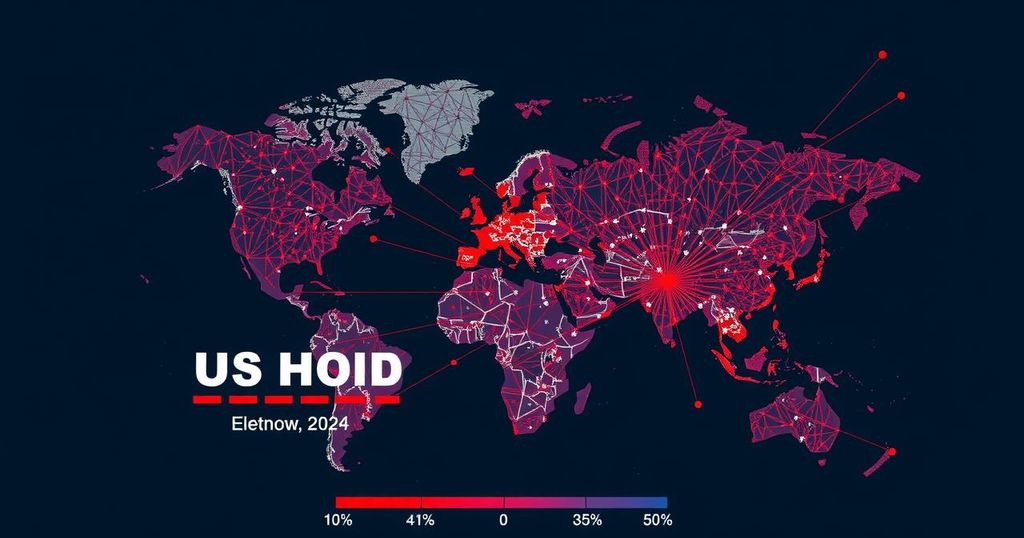Implications of the US Presidential Election on Global Affairs

The US presidential election will significantly impact global dynamics, particularly regarding military alliances, international relations, and climate efforts. The choice between Kamala Harris, likely to continue Biden’s policies, and Donald Trump, whose agenda could lean toward isolationism, presents a critical moment for the future of US influence. Experts express concerns about NATO’s stability, the US’s role in resolving global conflicts, trade relations with China, and leadership in climate initiatives depending on the election’s winner.
The upcoming US presidential election holds significant implications for global dynamics, particularly in relation to military alliances, international relations, trade, climate initiatives, and humanitarian efforts. As President Joe Biden’s term nears its conclusion, the world looks toward the potential directions under either Kamala Harris or Donald Trump, both of whom represent contrasting foreign policy approaches. Harris is expected to maintain continuity with current policies, especially regarding NATO and support for Ukraine, whereas Trump’s agenda may favor an isolationist stance and prioritize national over global interests, potentially undermining long-established alliances. Military policy remains a focal point, with NATO’s future under scrutiny depending on who emerges victorious. Rose Gottemoeller, the former deputy secretary general of NATO, expresses concern that Trump’s erratic approach could destabilize transatlantic relations, contrasting with Harris’s anticipated commitment to collective defense and sanctions against aggressions by adversarial forces. The next president will also face complex global conflicts, such as the wars in Ukraine and Gaza. Comfort Ero of the International Crisis Group warns that US influence in international conflict resolution may wane, making it vital for the winning candidate to restore the nation’s moral standing on the global stage. The repercussions would be felt across various geopolitical landscapes, as regional conflicts draw in diverse stakeholders with competing interests. Trade relations, particularly with China, are poised for heightened scrutiny, as Trump’s proposed tariffs threaten to complicate diplomatic and economic interactions. Rana Mitter notes a potential stability in relations should Harris win, unlike the unpredictable nature of a Trump presidency. On climate change, Mary Robinson underscores the critical role the next US president will play in shaping global climate policy, emphasizing the need for continued leadership and momentum in environmental initiatives rather than retreating into isolationist ideologies. In humanitarian affairs, Martin Griffiths highlights the essential influence of the US in advocating for global stability and principled leadership, lamenting the potential consequences of a Trump administration’s isolationist tendencies. In summary, the implications of this US election extend well beyond its borders, influencing military alliances, international humanitarian efforts, global trade dynamics, and climate policies, underscoring America’s pivotal role in shaping the current and future state of the world.
The context of the upcoming US presidential election is essential in understanding its potential impact on international relations. With President Joe Biden’s administration facing scrutiny over various global issues, the choices presented by candidates Kamala Harris and Donald Trump reflect starkly divergent foreign policy agendas. The election occurs against a backdrop of increasing global instability, notable conflicts in Ukraine and Gaza, and rising tensions with China, all of which underscore the necessity of competent and consistent US leadership. As military and diplomatic ties evolve, the stakes associated with this election have prompted experts across the geopolitical landscape to weigh in on the prospective outcomes of either administrative direction, forecasted to affect not only national interests but the broader global community as well.
In conclusion, the forthcoming US election is more than a domestic affair; it embodies critical global implications that could redefine international relations and provoke responses across military, humanitarian, and environmental domains. The contrasting approaches of the candidates present a pivotal moment for the US’s role on the world stage, with potential ramifications for allies and adversaries alike. As we navigate through an era marked by complex geopolitical challenges, the outcome of this election could either reinforce or alter America’s position as a key influence in fostering global stability and cooperation.
Original Source: www.bbc.com








